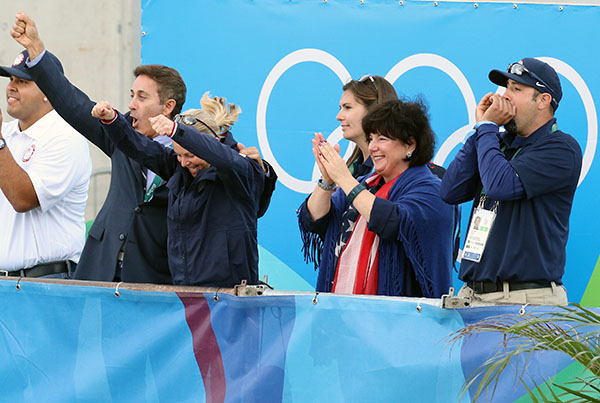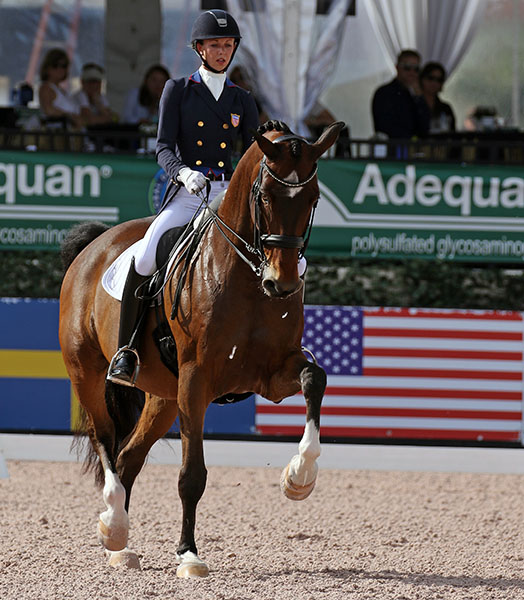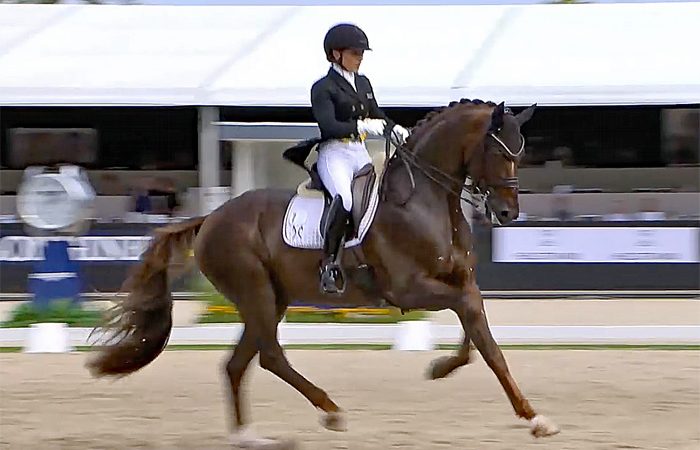Laura Graves Talks Of Her Journey On Verdades So Far & Their Future
8 years ago StraightArrow Comments Off on Laura Graves Talks Of Her Journey On Verdades So Far & Their Future

In less than three years, Laura Graves has gone from an unknown rider of a horse, Verdades, a KWPN gelding now 15 years old, bought from a video and ridden to the highest level of dressage–Olympic team medalist, World Games and World Cup competitor, Pan American Games team gold and individual silver medals, U.S. Grand Prix champion, ranked as high as No. 4 in the world and the rare accomplishment of achieving 80 per cent at Grand Prix. KENNETH J. BRADDICK of dressage-news.com who has chronicled the Big Tour career of the pair talked to Laura about their journey to the Olympic podium and what is next.
Feb. 22, 2017
Dressage-news.com: You work with Debbie McDonald who had two of the four riders, Kasey Perry-Glass as well as you, on the U.S. team at the Rio Olympics and is working with several other riders who may be on future American teams. What does that relationship mean to you?
Laura: I think every day about how lucky I am that in 2014 Deb agreed to be my teacher. Everybody wants Deb right now, and she tries so hard to accommodate everybody, always putting herself last. This entire sport right now, she almost singlehandedly takes care of everybody in four divisions. She coaches top Young Riders, top U25 riders, the top small tour, the top team horses. It’s so impressive. When I come down here, I have my lesson then sit and watch her teach all day. She’s just remarkable. The person who she is is exactly who she is as trainer. She’s fair and she’s kind and she loves the horses.

D-N: Is she tough when she need’s to be?
Laura: Absolutely. When she’s tough you know she’s serious. She’s so kind and sweet all of the time that if she finally says to you, “Stop!” and points a finger at you you know she means business. And you take it very, very seriously (laughs).
D-N: Explain the USA Olympic team experience? I’ve seen many teams from many nations over the years and there are some that stand out but I can’t recall seeing any team that has been as close not just before and during the Olympics but six months later.
Laura: We truly do support each other. Yes, we were a team, the Olympic team in Rio. But it’s stronger than that, deeper than that, it’s bigger than that. We support one another, we push one another to become better because in the end we’re a team. In order to compete as an individual you have to do well as a team. It’s different for us. We really made friendships. We’re a team but we’re also very close friends. We enjoy each other’s company.
There’s a community now in American dressage. We’re a team of good people who are good to their horses, good for the sport and we’re good to each other. And, hopefully, that continues to spread, spread down to our U25s to our Young Riders to our Juniors. And they see this, the way we treat one another. When we’re warming up, Steffen and I aren’t chatting, Kasey and I aren’t smiling at each other. We’re out there warming up and we’re all out there to win. That’s what makes a great team: when everybody is that competitive and still has the sportsmanship to appreciate when someone has truly done a better job. To say, “Hey, you deserve that.” To really support one another is what brings a team to a podium.

D-N: I’ve heard the word “bullies” used by some of you. Almost as if the team stood up to someone or something and you became closer as a team. What does it mean?
Laura: I think as a team, and I don’t mean just those of us who rode on the Olympic team, or those of us who rode on the teams in France and elsewhere, but a team of our federation, the U.S. Equestrian Team Foundation (raises funds for international competitions), and all those peers and people who sit on committees for us, this is the team that’s standing up to bullies and saying: “Listen, we have these codes of conduct in place and we expect our athletes to behave a certain way. You are ambassadors for our sport and you’re going to be wearing our flag and you must treat that flag respectfully.” I feel that way as an American not just as a dressage rider, and I think it’s great that people are finally putting their foot down and saying, “If you’re not following the rules or being professional…” We’re all role models for someone—whether it’s a kid or an adult amateur client of mine, we’re all role models for someone. It’s a privelege to wear that flag and you’d better do so with class.
D-N: You have achieved so much in a relatively short time. How much has your life and your thinking changed?

Laura: In all honesty my day to day life hasn’t changed that much. But the doors that have been opened for me and the knowledge that I have gained and the confidence in my ability to train horses has grown immensely. The schedule that I keep with the horses and being able to stand up and say, “No. You’re not riding today.” It’s unusual for people who come from programs that work hard six days a week. It’s just not mine.
It has changed a little bit, becoming comfortable with mistakes. Our last show coming out (at a World Cup event in January) maybe it was two per cent lower than in Rio. A year ago that would have really concerned me. And now with all this advice that I’ve gathered from Deb and Betsy Juliano who gives me great advice, who has a really good way of talking to people. She gives me advice in a way that it’s not telling you; it’s asking and relating it to something she’s experienced. It’s a very special thing to have people in your life to guide you in that way and help you make better choices for yourself. Hopefully, I’m doing that and setting myself up for the future.
D-N: Verdades continues to perform at the highest level. Do you think about how much longer you will compete him?
Laura: I think about it all the time. He’s achieved all of my dreams. This one horse in three years made all of my dreams come true. We reached 80 per cent, we won an Olympic medal. What more can you really ask of him. He’s still extremely fresh as I think everyone would recognize (laughs), so as long as he wants to do this we’ll keep doing it. And eventually, I don’t think it’s going to be a problem, but as horses age I think it’s our duty to respectfully care for them. So if we qualify for World Cup in one more show I may not bring him out again before the World Cup (in Omaha Mar. 27-April 2).

I will very carefully select our competitions, whether it’s the Festival of Champions or showing at maybe one or two events in Europe this summer, who knows. It will be much more laid back than last year was. He has nothing to prove. We’ll just take care of him.
I would love to get another World Games on him if he goes next year as well as he’s started this year, especially as it’s at home (in Tryon, North Carolina). Inevitably the horses make the decision, we’ll just listen and keep up with our program and rest him when he needs it and ride him when he wants.
—-
At the end of the conversation, Ashley Holzer, a four-time Olympian for Canada stopped by to tell Laura, “amazing, amazing”.
Laura: I told you it’s contagious.

